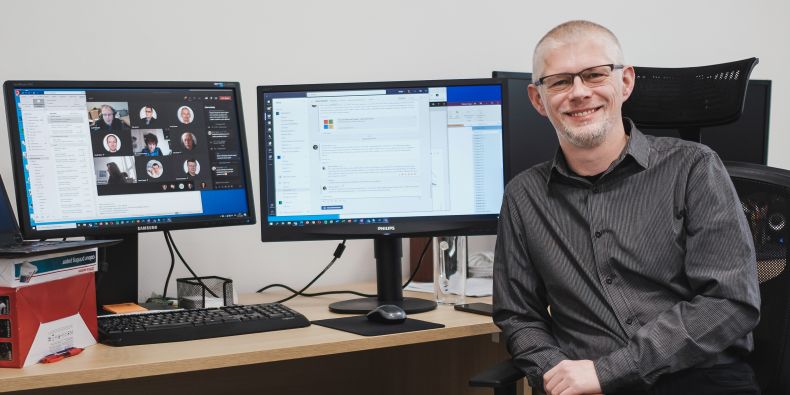With the sudden move to online education this spring, everybody needed help to figure things out and it was Břetislav Regner from the Institute of Computer Science (ICS) who usually answered the queries. He says that although last March and April were more challenging than usual for his department, MU tackled the challenge head-on.
The statistics for MS Teams usage at MU is the best way to convey the rise in the use of modern platforms for online education and team communication. At the beginning of 2020, the number of active MS Teams users at MU was less than 300; by the end of the year, it was over 33,000. With 30,000 students and 6,000 employees at the university, this is essentially everyone.
“Earlier this year, such widespread use of this tool at an institution that runs on in-person, e-mail and phone communication was beyond the imagination of me and my colleagues at ICS. Coincidentally, our annual plan included launching a campaign to support the use of MS Teams this autumn, but I don’t think we would have achieved anything close to this usage rate if it wasn’t for the crisis,” says Regner, who provides IT support for Microsoft Office 365 tools and is also the muni.cz website coordinator.
Despite the eventual success of Teams, the first chaos-filled days and weeks after the university closed down last March will remain with him for a long time. The first thing his department had to do was to develop basic user guides for MS Teams, which until then had been used and tested primarily by the IT staff.
Next up on the agenda was to make sure that the key parts of university administration – the management and the Emergency Board – could do their jobs. Making sure that the MU Academic Senate could legally vote online, particularly due to the upcoming transfer of the Faculty of Pharmacy to Masaryk University, was another pressing issue. And last but not least, they had to answer the first queries from teachers who wanted to teach online.
In April, the university set up a working group to prepare the methodology for online exams, including the final exams. Regner did not participate in this group because he already had his hands full putting the final touches to the transfer of the Faculty of Pharmacy and all its IT systems, from the website to the networks, to Masaryk University.
Thankfully, things calmed down over the summer holidays, but another challenge came with the start of the autumn semester when in-person classes were cancelled once again. However, teams for teaching purposes can now be created directly in the MU Information System, which makes online teaching much easier for lecturers.
MS Teams is now ubiquitous at Masaryk University with over 180,000 chat messages, 7,000 meetings and 4,800 two-person calls over MS Teams in the last week of November alone.
“Videoconferencing tools are now used as a matter of fact although last spring, most people were unfamiliar with MS Teams and did not have microphones or cameras installed. While the recent months have been immensely challenging, I believe that the energy we all had to invest will be repaid in the long term, even when our working lives return to normal,” says Regner.
